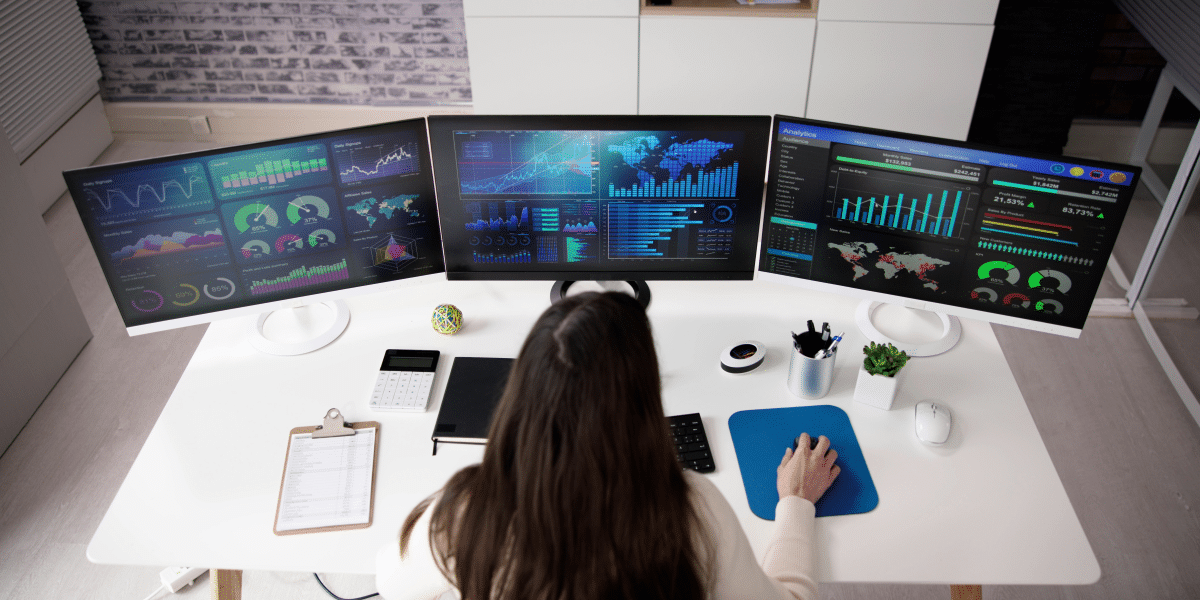Image commercially licensed from Unsplash
Embarking on your music production journey can be both exciting and daunting. With countless equipment options available, knowing what you need to start producing high-quality music is essential. This comprehensive guide will cover the essential tools for beginner music producers, ensuring you have everything you need to kickstart your creative process.
Digital Audio Workstations (DAWs)
A Digital Audio Workstation (DAW) is the heart of your music production setup. The software application allows you to record, edit, and mix audio tracks. There are numerous DAWs available, each with its unique features and workflow. Some popular options include:
- Ableton Live – Known for its intuitive interface and versatility, it is ideal for live performances and studio production.
- FL Studio – Favored by electronic and hip-hop producers, FL Studio offers various virtual instruments and effect plugins.
- Logic Pro – Exclusive to macOS users, Logic Pro is a powerful, feature-rich DAW that seamlessly integrates with other Apple products.
- Pro Tools – The industry standard for professional recording studios, Pro Tools provides a comprehensive set of music and audio post-production tools.
Audio Interfaces
An audio interface is a crucial piece of hardware that connects your computer to your studio monitors, headphones, and other audio equipment. It also converts analog audio signals into digital signals and vice versa. Key factors to consider when choosing an audio interface include:
- Inputs and Outputs – Ensure your audio interface has enough inputs for your microphones and instruments and outputs for your studio monitors and headphones.
- Audio Quality – Look for an interface with a high-quality preamp and digital converters to maintain the fidelity of your recordings.
- Compatibility – Make sure your audio interface is compatible with your computer and DAW of choice.
Popular audio interfaces for beginners include the Focusrite Scarlett series, PreSonus AudioBox, and Steinberg UR series.
Studio Monitors and Headphones
Accurate monitoring is essential for producing professional-sounding mixes. Studio monitors and headphones are designed to provide a flat frequency response, allowing you to hear your music without the coloration in consumer-grade speakers.
- Studio Monitors – Investing in quality studio monitors will enable you to mix your music accurately. Popular beginner models include the Yamaha HS series, the KRK Rokit series, and the PreSonus Eris series.
- Headphones – A good pair of studio headphones is invaluable for checking your mixes and recording when you can’t use studio monitors. Look for models with a flat frequency response and comfortable fit, such as the Audio-Technica ATH-M50x or Beyerdynamic DT 770 Pro.
Microphones and Accessories
If you plan to record vocals or live instruments, you’ll need a microphone and some essential accessories:
- Microphone – A large-diaphragm condenser microphone is a versatile choice for recording vocals and a variety of instruments. Popular options include the Audio-Technica AT2020, Rode NT1-A, and AKG P220.
- Mic Stand – A sturdy mic stand will securely hold your microphone in place, allowing you to focus on your performance.
- Pop Filter – This handy accessory reduces plosive sounds and protects your microphone from moisture, ensuring clean and consistent recordings.
- Cables – Don’t forget high-quality XLR cables to connect your microphone to your audio interface.
MIDI Controllers
A MIDI controller is a valuable tool for composing and arranging music, allowing you to control virtual instruments and manipulate MIDI data within your DAW. There are various types of MIDI controllers available, each catering to different needs and preferences:
- Keyboard Controllers – These resemble traditional piano keyboards and are ideal for composers and keyboard players. Popular options include the Akai MPK Mini, Novation Launchkey, and Arturia KeyLab Essential.
- Pad Controllers – With a grid of pads designed for triggering samples and programming drums, pad controllers are perfect for beatmakers and electronic music producers. Some notable models are the Native Instruments Maschine, Akai MPC series, and Ableton Push.
- Control Surfaces – These controllers provide hands-on control over your DAW’s mixing and automation functions, offering a more tactile approach to music production. Examples include the PreSonus FaderPort, Behringer X-Touch, and Mackie Control Universal Pro.
Acoustic Treatment
The acoustics of your room can significantly impact the quality of your recordings and mixes. Proper acoustic treatment can help minimize reflections, standing waves, and bass buildup, ensuring a more accurate listening environment. Here are some essential acoustic treatment tools to consider:
- Bass Traps – These are designed to absorb low-frequency energy and can be placed in room corners where bass accumulates.
- Acoustic Panels – Made from dense, absorptive materials, acoustic panels can be mounted on walls and ceilings to reduce reflections and improve the overall sound of your room.
- Diffusers – These devices scatter sound waves, creating a more even distribution of sound energy and preventing unwanted reflections.
- Monitor Isolation Pads – Placing these pads under your studio monitors can reduce vibrations and improve the accuracy of your monitoring system.
Software Instruments and Effects
Consider investing in additional software instruments and effects to expand your creative palette and enhance your productions. These plugins can emulate classic hardware synthesizers, drum machines, and studio processors, providing endless sound design and mixing possibilities. Some popular plugin developers include:
- Native Instruments – Known for their comprehensive software suites like Komplete and Maschine, Native Instruments offers various virtual instruments, effects, and sample libraries.
- Spectrasonics – Creators of the highly acclaimed Omnisphere, Trilian, and Stylus RMX, Spectrasonics specializes in cutting-edge software synthesizers and sample-based instruments.
- FabFilter – With a reputation for exceptional sound quality and intuitive interfaces, FabFilter offers a range of professional mixing and mastering plugins, including their Pro-Q, Pro-C, and Pro-L series.
- Waves – As one of the leading developers of audio plugins, Waves offers an extensive collection of effects, processors, and virtual instruments used by top producers and engineers worldwide.
In conclusion, with the right combination of music production equipment, you’ll be well on your way to creating professional-sounding tracks. By investing in a quality DAW, audio interface, monitoring system, and other essential tools, you’ll be fully equipped to explore your creativity and develop your skills as a music producer.








